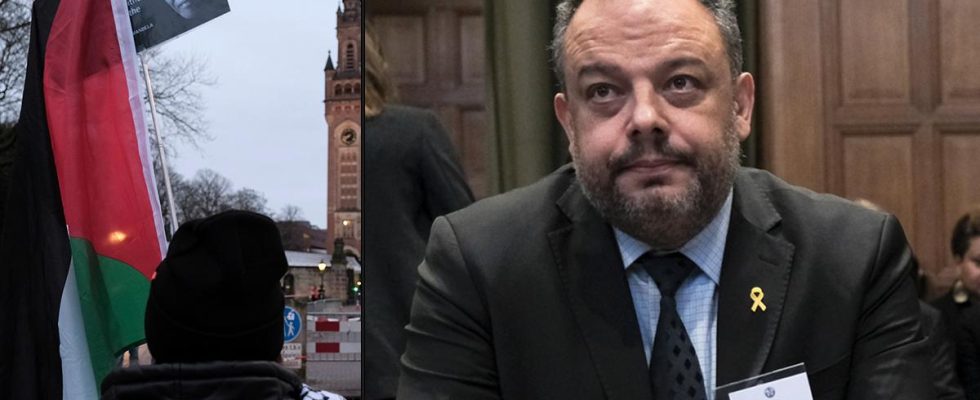Updated 20.56 | Published 20.50
unsaveSave
share-arrowShare
Israel’s war in Gaza is not about destroying the Palestinian people but protecting Israelis.
So said the country’s lawyers in the International Court of Justice today.
The legal dispute, in which South Africa accuses Israel of genocide in Gaza, was called “deeply distorted”.
On Friday, Israel’s lawyers appeared before the International Court of Justice (ICJ) in The Hague in the Netherlands for a hearing, after South Africa sued Israel for genocidal actions against Gaza.
The lawyer Tal Becker began by saying that Israel’s military action in Gaza constitutes self-defense against Hamas and other terrorist organizations:
– What Israel strives for by operating in Gaza is not to destroy a people but to protect a people, a people who are under attack on several fronts, he said among other things.
expand-left
full screen Legal adviser to Israel’s Foreign Ministry Tal Becker, left, and jurist Malcolm Shaw, right, at the International Court of Justice in The Hague, Netherlands, on January 11, 2024. Photo: Patrick Post/AP
He called South Africa’s mood “a deeply distorted history”.
– If there have been any acts that can be characterized as genocidal, they have been against Israel, Tal Becker said.
Pictures of the hostages
The Israeli lawyers brought up several times the attacks by Hamas against Israel on October 7, in which over 1,100 people, mainly Israelis, were killed and over 200 people were kidnapped. Images of civilians still being held hostage by Hamas in Gaza were shown, as well as clips from the attacks on southern Israel.
According to Tal Becker, the purpose of the review was for the court to get a picture of the threat to which Israel is exposed from Hamas and thereby understand the war in Gaza.
Tal Becker said that Hamas’ clear agenda is to exterminate Jews.
He also accused South Africa of having close ties to Hamas, something that Israel’s Foreign Ministry also claimed yesterday. A foreign ministry spokesperson called South Africa “Hamas’ extended legal arm”.
Zane Dangor, director-general of South Africa’s Department of International Relations, strongly denied the allegations on Friday afternoon:
– South Africa’s legal team represents the people of South Africa, he said according to Al Jazeera.
He also said that the country is pursuing the case in the ICJ “because we want to stop the suffering of Palestinians, something that is in the interest of justice”.
expand-left
Zane Dangor, South Africa’s director of international relations, speaks to the media after a hearing at the International Court of Justice in The Hague, Netherlands, Friday, Jan. 12, 2024. Photo: Patrick Post/AP
Want to see an immediate stop
It may take several years before the court makes a final decision regarding the case in its entirety.
Therefore, in a so-called interim claim, South Africa has requested that the ICJ through “provisional measures” order Israel to immediately stop its military operations in Gaza.
That decision can be made in a matter of days or weeks and apply while the rest of the legal process continues.
Israel’s lawyers also responded to the interim claim on Friday:
Israel: Would stop self-defense
“Interim measures would stop Israel from defending its citizens, more citizens would be attacked, raped and tortured, and interim measures would prevent Israel from doing anything,” said lawyer Christopher Staker.
– If these were to be approved, it would mean that when a terrorist group commits terrorist attacks against a state, a third party can apply for provisional measures to stop the state’s self-defense.
Decisions of the ICJ are final and cannot be appealed.
However, countries do not always follow its rulings. For example, the ICJ has ordered Russia to stop the invasion of Ukraine, something that has not been obeyed.
expand-left
full screen Judges and parties sit during a hearing at the International Court of Justice in The Hague, Netherlands, Friday, Jan. 12, 2024. Photo: Patrick Post/AP
FACTS Court cases in the International Court of Justice
A legal case in the International Court of Justice (ICJ) is not a simple or quick process and it can take several years before the court makes a final decision. Therefore, in the current legal case, South Africa has also requested that the ICJ order Israel to immediately stop its military operations in Gaza, a decision that could be decided in a few days or weeks and apply while the rest of the legal process continues.
For a case to be brought before the International Court of Justice in The Hague, disputing states must jointly bring a case there, or a state can request that the court take up a case involving another country. That is the case here, when South Africa raised the issue of Israel’s actions in Gaza.
In the ICJ, the countries involved in a case are represented by representatives who are usually appointed by the country’s Ministry of Foreign Affairs or its diplomatic representation in The Hague.
The decisions made by ICJ judges are final and cannot be appealed. By signing the UN Charter, member states have committed to comply with the court’s rulings, and it is rare for the judgments to be disobeyed. If one of the parties in the process believes that the other party is not complying with a ruling from the ICJ, the issue can be raised in the UN Security Council, which can make decisions on recommendations or measures to ensure that the ruling is followed.
(Source: TT)
Read more
